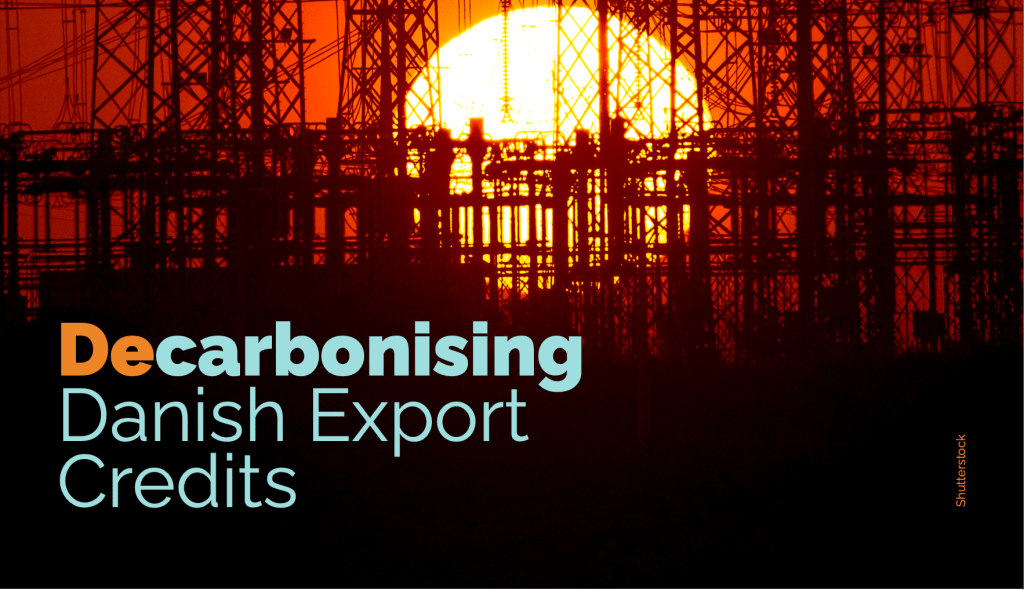
With many DKK billions at its disposal, the Danish Export Credit agency EKF finances over 100 projects a year. For most projects, no assessment of the impact on the climate, environment, and local communities is undertaken or published, as this is not required for smaller projects or projects that are not considered high-risk by international standards. In a new report we shed light upon the deficiencies in international standards of transparency and environmental and social due diligence in export credits. The report recommends applying higher EU-standards as part of a comprehensive decarbonisation strategy.
In response to worsening climate change, the IPCC has announced that financial and governmental support of high emission sectors must be decreased, and climate resilience increased. In line with the Paris Agreement goals, governments and their institutions worldwide are taking steps to phase out fossil fuels. The UK government’s latest move to cut all international public finance for fossil fuels – with exemptions – by March 2021 sets the stage for a broader alliance of progressive governments to align their climate strategies before COP26 in November. Although it launched an ambitious climate strategy in 2020, and Denmark has yet to follow suit with a plan to phase out all fossil fuels for its export credit agency (ECA) Eksport Kredit Fonden (EKF), and its broader international public finance.
Moving towards zero-carbon
The elimination of fossil fuels is crucial and has been called for by climate scientists and politicians for many years. But the problem is much bigger: To keep to 1.5 °C average global warming, all polluting industries must move towards a zero-carbon portfolio. Moreover, moving away from black energy will not necessarily lead to more green energy: Fossil fuel financing in the Danish EKF is limited and because export credit agencies are demand-driven, their portfolios reflect the applications they receive. If these applications suffice international and national standards, they are approved, whether they are sustainable or not.
This means that there needs to be a more comprehensive decarbonisation strategy. The European Green Deal has set targets to help different sectors align with the objective of net-zero emissions by 2050, and the EU taxonomy guides green investments. Here, a screening of EKF’s portfolio shows that while its support of fossil fuels is limited and its share of renewables large, it has several projects in sectors with a potentially high climate footprint, such as cement and mining, large hydropower and in the livestock and chemical sectors. It is also likely to increase its involvement in cement in the coming years. A decarbonisation strategy for all projects is essential to prevent ECA support for fossil fuels and other high-emission sectors in the future.
Weak international standards
In this context, weak international standards, and a lack of transparency in many ECAs’ operations is concerning. Data on their individual projects and decision-making processes is often unavailable, so their adherence to regulations and guidelines cannot be confirmed and they are not held to account for their negative impacts on the climate, environment and society. This is particularly alarming because ECAs operate in countries and sectors that are known to be high-risk. The extension of export credit rights and values in response to Covid-19 further reinforces the need for transparent reporting. International standards only require the provision of limited and selective information on environmental and social due diligence, mostly for Category A project financing or guarantees. This makes it impossible to track the foreseeable environmental and social impacts commonly associated with either the type of project, or the country in which it will take place.
The report reveals that 89% of EKFs projects in 2019-2020 did either not undergo, or publish, in-depth environmental and social assessment. This is, because international OECD standards only require projects of a value of over SDR 10 million and those with high environmental and social risk (regardless of their size) to undergo an environmental and social assessment. However, OECD standards do encourage member states and their ECAs to apply higher EU standards: The report recommends EU ECAs, such as EKF, to comply with the EU’s foreign policy goals, as enshrined in Articles 3 and 21 of the Treaty of the European Union (TEU). These standards require an environmental and social assessment to be carried out for all projects.
An example of the implications of weak international standards: EKF supported Danish trade with the blacklisted, Brazilian mining company Vale SA. The project did not undergo an environmental and social assessment, as it is only a small (SME) guarantee. The project is moreover not categorized as Category A, as the product supported is telecommunication equipment for a mining project (auxiliary industry), which EKF did not categorise as part of the mining project. The decision-making basis for this classification was not published. Our finding gained attention in the national news.

